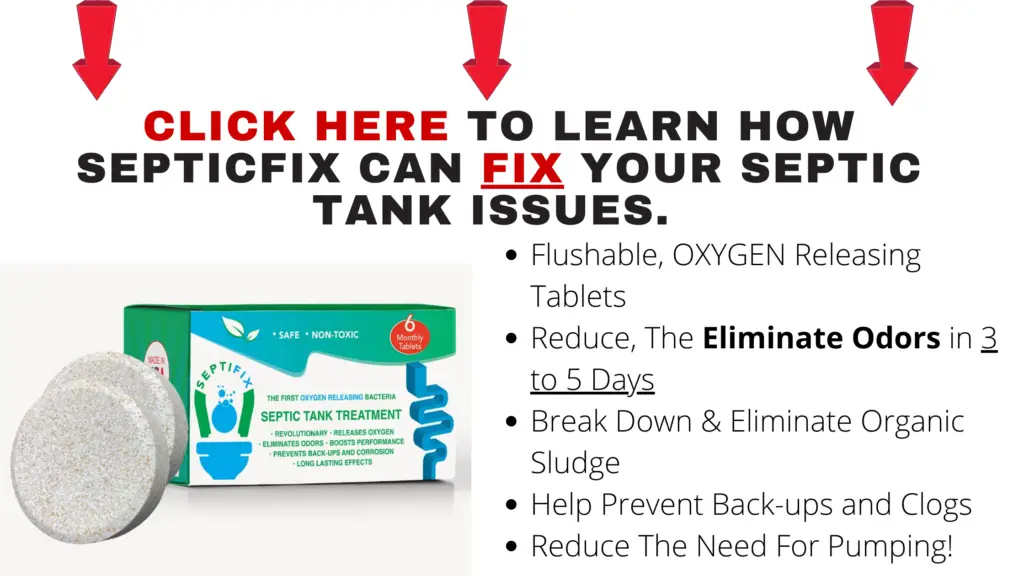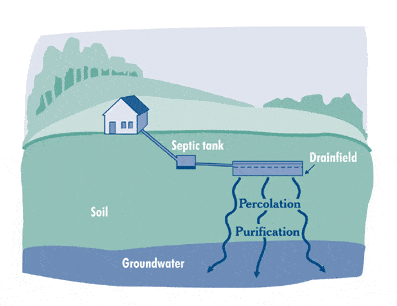Disclosure: This post contains affiliate links, meaning we may earn money or products from the companies mentioned in this post if you purchase a product through one of our links. An example would be Amazon.
Diagnosing and Fixing Toilet Gurgling With A Septic System
Before diving into the reasons behind a gurgling toilet, let’s take a quick moment to understand how a septic system works. A septic system is a mini wastewater treatment plant located underground on your property. Here’s a simplified breakdown:

- Septic Tank: This watertight tank is the first chamber where wastewater from your house flows. Solids settle to the bottom as sludge, while lighter materials like oil and grease float to the top as scum. The clarified liquid in the middle, called effluent, exits the tank and travels to the next stage.
- Drainfield: The effluent from the tank flows through a network of perforated pipes buried in a gravel-filled area called the drainfield. Here, the wastewater is naturally treated by the soil as it slowly seeps into the ground.
Knowing this basic process will help you understand how problems in the septic tank can affect your toilet.
Call Septic Service Pros 1.855-925-0760 For Service or Request a Quote
Signs of Septic Tank Problems (Beyond Toilet Bubbling)
A bubbling toilet is a telltale sign of a septic tank issue, but it’s not the only one. Here are additional red flags to watch out for:
- Slow Drains in Multiple Fixtures: If your sinks, showers, and bathtub are also draining sluggishly, it could indicate a clog somewhere in the main drain line leading to the septic tank.
- Sewage Backups: Raw sewage backing up into your drains or toilets is a serious problem and signifies a blockage or a full septic tank.
- Foul Odors: Unpleasant sewage smells around your house or near the septic tank area can indicate a problem with the system’s ventilation or a leak.
- Lush Green Patches: If you notice unusually green, overgrown patches of grass around the drainfield, it could be a sign of effluent surfacing due to a clogged drainfield.
- Standing Water: Standing water near the septic tank can indicate a clogged drainfield or a problem with the tank itself.
If you experience any of these signs alongside the toilet bubbling, it’s important to address the issue promptly to prevent further damage to your septic system.
Why Does My Toilet Gurgle on a Septic System?
Now that you understand the basics of septic systems, let’s explore the common reasons behind a gurgling toilet:
- Clogged Drain Line: This is the most likely culprit. Waste or debris can build up in the drain line that connects your toilet to the septic tank, causing a blockage and air pressure issues that lead to the gurgling sound.
- Full Septic Tank: Over time, your septic tank accumulates sludge and scum. If the tank is full, there’s no room for new wastewater, leading to backups and gurgling sounds in your drains, including the toilet.
- Vent Stack Blockage: The vent stack allows air to flow through the drainage system. If it’s blocked by debris or animal nesting, negative air pressure can build up, causing the gurgling noise in your toilet.

Fixing a Bubbling Toilet: Solutions You Can Try
Before calling a professional, there are a few DIY solutions you can attempt to fix the bubbling toilet:
- Plunging: This is the simplest solution for a clogged drain line. Use a toilet plunger to try and dislodge the blockage.
- Drain Snake: If plunging doesn’t work, consider using a drain snake specifically designed for toilets. This tool can reach deeper clogs.
- Identify Additional Blockages: Listen for gurgling sounds in other drains (sinks, showers) in your house. If these drains are also gurgling, it might indicate a clog in the main drain line leading to the septic tank. In this case, it’s best to call a professional plumber.
When to Call A Professional Plumber
If the DIY solutions don’t work, or if you experience other issues like slow drains, sewage backups, or foul odors, it’s time to call a professional plumber with septic system expertise. Here are some situations when calling a professional is recommended:
- Vent Stack Blockage: Clearing a blocked vent stack requires specialized equipment that most homeowners don’t have.
- Full Septic Tank: A professional can assess the tank’s level and safely pump it out if needed.
- Tree Root Infiltration: Tree roots can cause severe damage to septic systems. Professionals can identify and remove tree root blockages.
- Broken Drain Lines or Septic Tank Components: Repairing broken components requires a qualified plumber.
Call Septic Service Pros 1.855-925-0760 For Service or Request a Quote
Want to watch a video instead?
Call Septic Service Pros 1.855-925-0760 For Service or Request a Quote
Preventing Toilet Bubbling and Septic System Issues
Proactive maintenance is key to preventing toilet bubbling and keeping your septic system functioning smoothly. Here are some steps you can take:
Do’s:
- Regular Septic Tank Pumping: Schedule a septic tank pumping service every 3-5 years. This frequency can vary depending on household size and wastewater usage. A professional can assess your specific needs.
- Use Septic-Safe Products: Avoid harsh chemicals, bleach, or grease down the drain. These can kill the beneficial bacteria in your septic tank that break down waste. Opt for septic-safe cleaning products whenever possible.
- Practice Water Conservation: Minimize excessive water usage to prevent overloading your septic tank. Fix leaky faucets and toilets promptly. Shorter showers and spreading out laundry loads can also help.
- Dispose of FOG (Fats, Oils, Grease) Properly: Never pour FOG down the drain. FOG can solidify and clog drain lines. Instead, let FOG cool and solidify, then scrape it into a trash can.
Don’ts:
- Flush Non-Biodegradable Items: Only flush toilet paper and human waste. Avoid flushing wipes, diapers, feminine hygiene products, or anything else that won’t easily decompose in the septic tank. If you are going to use wipes, click here to find a list of the best choices.
- Plant Trees Close to the Septic Tank: Tree roots can invade and damage septic system components. Avoid planting trees closer than 50 feet from your septic tank or drainfield.
Professional Septic Service
A professional septic service company can help maintain your septic system and prevent problems before they arise. Here are some of the benefits of regular septic inspections and service:
- Early Detection of Issues: A professional can identify potential problems with your septic system during a routine inspection, allowing for early intervention and preventing costly repairs down the road.
- Proper Septic Tank Pumping: Septic tank pumping requires following specific procedures to ensure safe and efficient waste removal. A professional can ensure the tank is pumped correctly and dispose of the waste responsibly.
- Additional Services: Septic service companies offer various services beyond pumping, such as drainfield cleaning, system repairs, and septic system inspections.
Call Septic Service Pros 1.855-925-0760 For Service or Request a Quote
Conclusion
A gurgling toilet can be unpleasant, but it doesn’t have to be a major cause for concern. By understanding the reasons behind the bubbling and taking the necessary steps to address the issue, you can keep your septic system healthy and prevent further problems. If you’re unsure about the cause of the bubbling or the DIY solutions don’t work, don’t hesitate to call a qualified septic service professional. Remember, a well-maintained septic system is essential for a healthy and functional home.
Find Local Septic Pros
Visit our State Directory For Local Septic Service Providers
Sources Used In This Toilet Gurgling Article
https://homeguides.sfgate.com/fix-bubbling-gurgling-toilet-66566.html
https://blog.lyttleco.com/septic-tank-maintenance/how-to-tell-if-your-septic-tank-is-full-0
https://www.bobvila.com/articles/toilet-gurgles/
https://www.hunker.com/12499338/how-to-fix-a-leaky-septic-tank


